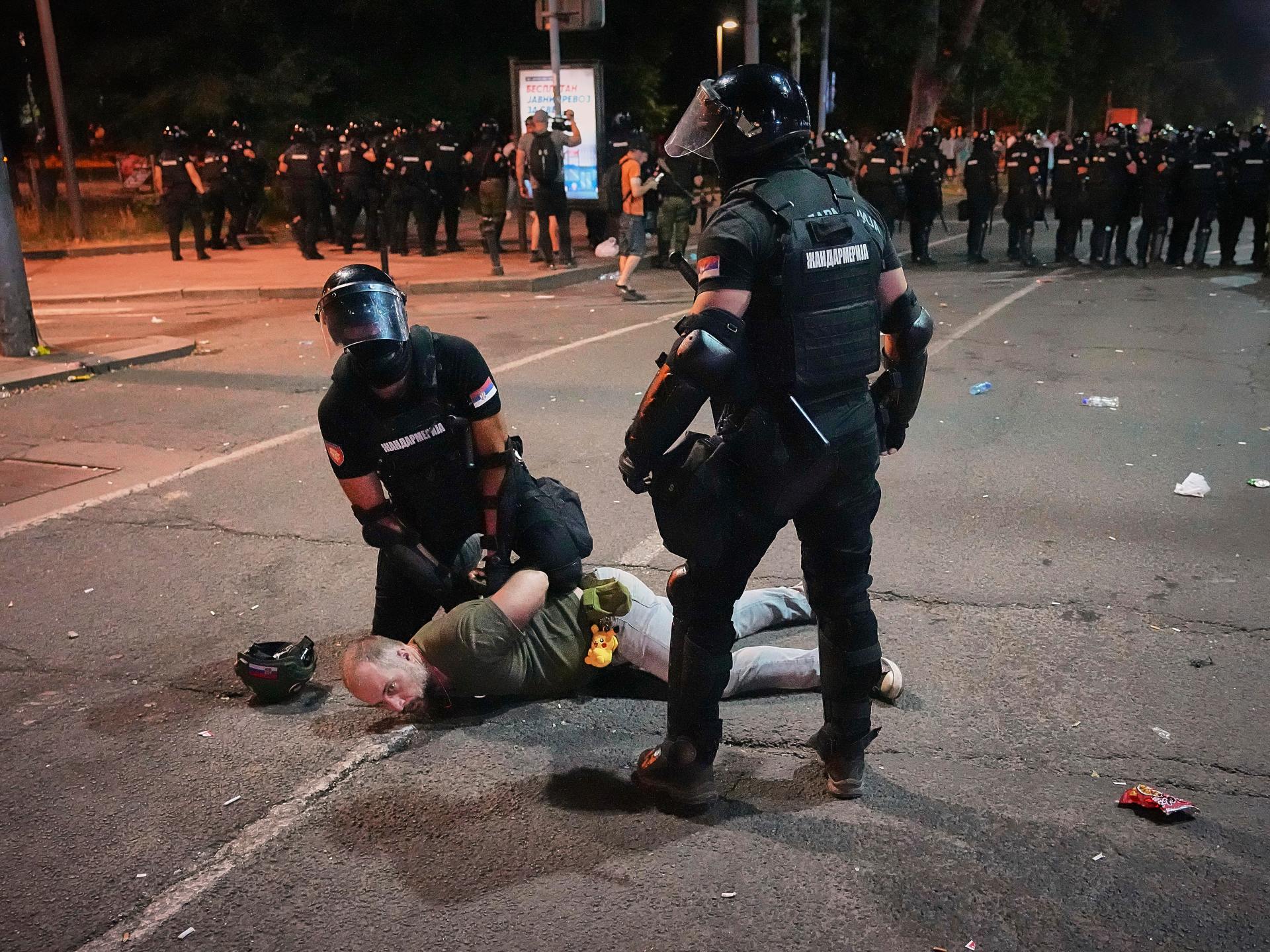Over the weekend, thousands of people in Serbia took to the streets to protest widespread corruption and the end of democratic freedoms.
Demonstrators clashed with riot police in Belgrade, the capital, after nearly eight months of unwavering opposition to populist President Aleksandar Vucic. They called the government “illegitimate” and threw rocks at riot police.
On Sunday, police claimed that 22 protesters sought medical attention while 48 officers were hurt. Ivica Dacic, the minister of interior, reported that 38 of the 77 detained people remained in custody on Sunday, the majority of whom were facing criminal charges.
Vucic charged the organizers with staging violent protests and attacking police, calling them “terrorists” who “tried to overthrow the state.”
Since taking office as prime minister in 2014 and president since 2017, critics accuse him of being more authoritarian. After bloody protests, Serbians have a history of rooting strongman leaders. They removed Slobodan Milosevic 25 years ago.
What demands do protesters have?
16 people were killed when a renovated rail station canopy in Novi Sad collapsed, prompting anti-government protests to begin in November. Many Serbians attributed the tragedy to the state’s infrastructure projects’ lack of oversight.
Vucic and his Serbian Progressive Party remained in power thanks to a reorganized administration following the disaster.
Since then, the student-led protests have focused their demands on the necessity of substitute elections in place of the 2027 regular elections. Organisers had issued an “ultimatum” for Vucic to make an announcement of a new vote by 9 p.m. (GMT) that day, a demand he rejected.
Protesters are also urging the government to carry out a number of reforms, including one that would allow all political participants to have access to the media, and preventative measures to stop vote-buying, to ensure that elections are free and fair.
Other requests include re-establishing the educational system, recognizing student bodies, or plenums, as legal entities, ensuring fair wages for all workers in the education sector, and respecting universities’ autonomy.
Vucic maintains a pro-European stance while Serbia is formally requesting EU membership. However, critics have also criticized the deepening ties between his government and Russia and China.
What has changed since the most recent protests?
The largest rally on Saturday since the Novi Sad disaster was the largest. According to sources, the crowd size was 36, 000, which is far below the Archive of Public Gatherings’ consensus estimate of 140, 000 people gathered.
This time, unlike previous peaceful demonstrations, police and protesters clashed violently with each other. In Belgrade, protesters hurled bottles and flares at rows of officers while using tear gas and batons.
Without providing any proof, Vucic has repeatedly asserted that the protests are part of a foreign plot to devastate his government. When he refers to an external country that seeks to destabilize Serbia, he has not specified who to refer to. There would be “no negotiations” with “terrorists,” according to Vucic.
They purposefully wanted to cause bloodshed. He declared that “the time for accountability is near.”
The government has been running a “smear campaign,” according to Engjellushe Morina, senior policy fellow at the European Council on Foreign Relations (ECFR).
According to Morina, “the government-supported media claims that they are terrorists and that they must be dealt with.”
The analyst said, “The government is unwilling to go any further,” adding that the situation is “emerging and both the government and protesters are determined not to back down this time.”
Have protesters in Serbia previously imposed changes on the government?
Yes . In the so-called “bulldozer Revolution,” they ousted Milosevic, who had been in power since 1989.
Following a presidential election that turned out to be significant irregularities but in which Milosevic won, a popular uprising started on September 24, 2000.
The protests came to a head with a bulldozer striking the Radio Television of Serbia, which is regarded as the epicenter of the government’s propaganda apparatus, on October 5.
Two days later, Milosevic resigned. He was detained in 2001 on suspicion of genocide, crimes against humanity, and war crimes, and the Belgrade government gave him to a Hague international tribunal. His trial there began in 2002, but Milosevic’s progress was slowed by his deteriorating health. In his cell in 2006, Milosevic was discovered dead.
The nation’s memory is etched on the wake of the protests that occurred in October 2000. Despite the government’s efforts to portray the protests as being foreign-led, Morina, an ECFR fellow, claimed that Vucic and Milosevic have stronger ties to the nation’s security apparatus than the protesters did in 2000.
Therefore, the ECFR analyst claimed that protesters had little faith in short-term gains. They are aware that this might have to continue for a while, she said.
What will the protest movement do next?
The student-led protest movement has pledged to stand up for what they believe. On Instagram, it stated that “this is not a time for withdrawal.”
Organisers of the rally on Saturday issued a statement to the crowd, urging Serbians to “take freedom into your own hands.” According to the statement, “the authorities had all the means and all the time to meet the demands and stop an escalation.”
Vucic, on his part, predicted more arrests. Eight people were detained later on Sunday on suspicion of planning to attack state institutions and block roads. Following that are likely more arrests.
The president said, “This is not the end, there will be many more arrests for attacking police,” adding that “identification of all individuals is underway.”
Arrests, in Morina’s opinion, could allow the movement to resume its march, but they are unlikely to stop the nationwide protests.
The analyst said, “They’re serious, and I don’t think they’ll leave quickly,” adding that she anticipates protesters to “eventually prevail.”
Source: Aljazeera

Leave a Reply